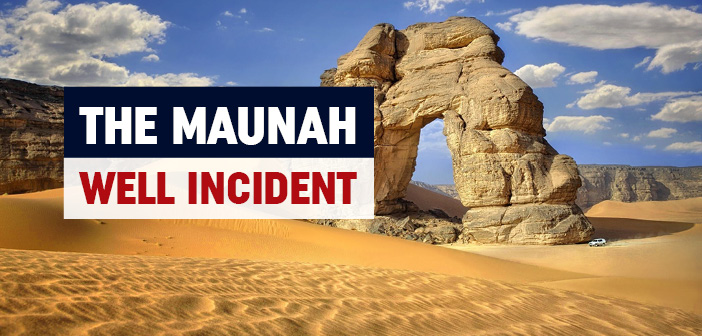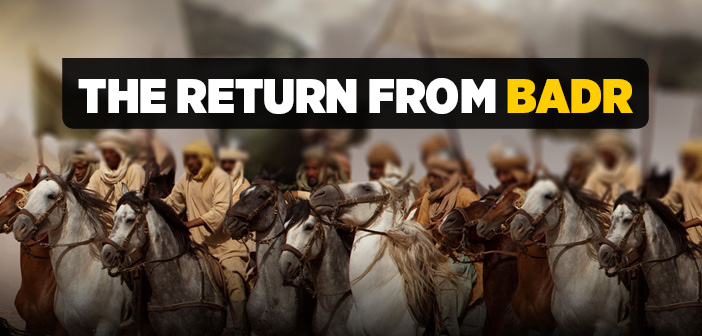What is maunah well incident? What happened in maunah well incident?
(Safar, 4 / July, 625)
During the same days as the Raji Incident, Abu Bara, a notable of the region of Najd, requested from the Noble Prophet -upon him blessings and peace- some Companions to teach them Islam. The Blessed Prophet -upon him blessings and peace- did not want to comply with the request, saying, ‘I fear my friends might come under the betrayal of the people of Najd!’
Abu Bara then pledged on behalf of his tribe that the Companions would in no way be harmed. The Blessed Prophet -upon him blessings and peace- further had a declaration written, which was sent to Abu Bara’s nephew Amir, governing the tribes of Najd in his uncle’s absence. Afterward, the Noble Messenger -upon him blessings and peace- designated a group of seventy Companions from the Suffa known as the Qurra and sent them with Abu Bara.
But when the envoy reached the Maunah Well, four stations away from Medina, they encountered a horrific betrayal. Amir, Abu Bara’s nephew, made a raid with a crowded army, without even having read the Blessed Prophet’s -upon him blessings and peace- letter. But when his tribe proved too hesitant to attack the Companions upon finding out that Abu Bara had declared his protection over them, Amir nonetheless lured the tribes of Usayya, Ri’l, Zakwan and Banu Lihyan into putting the Companions to the sword. Only Amr ibn Umayya was able to survive the massacre.[1]
Jabbar ibn Sulma, among the assailants during this tragic event, explains the following:
“I thrusted my spear into Amir ibn Fuhayrah who just moments before had invited me to Islam. I could see the blade of my spear come out from the other side of his chest. But still, he was jubilantly shouting, ‘By Allah, I have won!’
‘What could he have won?’ I asked myself. It was me, after all, who had killed him. In the meantime, his corpse ascended into the skies and disappeared from sight. What I saw then made me become a Muslim.” (Ibn Hisham, III, 187; Waqidi, I, 349)
Jibril -upon him peace- was the first to inform the Prophet of Allah -upon him blessings and peace- that the envoy of Companions were now reunited their Lord as martyrs; that their Lord was pleased with them and had also made them pleased.[2]
The Prophet of Mercy -upon him blessings and peace- became grief-stricken upon hearing this devastating incident. Lifting his hands aloft to the gates of the Divine, for a month after each fajr salat, he prayed, “O my Lord! Curse the tribes of Ril, Zakvan and Usayya who have rebelled against Allah and His Messenger!” (Bukhari, Jihad, 9, 19; Maghazi, 28; Muslim, Masajid, 297)
The tears of grief shed by the Believers were countered by the joyous frenzy of the hypocrites and Jews, who seemed more than content with what had unfolded since Uhud. Besides, their frustration over not having capitalized in the aftermath of Uhud and claimed ascendancy over the Muslims meant they were now giving full vent to their anti-Muslim malice. The hypocrites, especially, had begun glamorizing their betrayal of the Believers on the way to Uhud as a clever move, rebuking the Muslims, who had given many casualties during the Battle, with the smug comments:
“Had those who died listened to us in the first place, they would not have died.” The Quran’s response was stern:
“Those who said of their brethren whilst they (themselves) held back: Had they obeyed us, they would not have been killed. Say: Then avert death from yourselves if you speak the truth.” (Al’i Imran, 168)
“And a soul will not die but with the permission of Allah the term is fixed…” (Al’i Imran, 145)
“I have never seen the Messenger of Allah -upon him blessings and peace- grieve more over anything than the martyrs of the Maunah Well”, Anas -Allah be well-pleased with him- later said (Muslim, Masajid, 302). The martyrs of the Maunah Well massacre were entirely of the Suffa, devoted teachers of the Quran and Sunnah who were reared under the spiritual training of the Blessed Prophet -upon him blessings and peace- .
The Raji and Maunah Well incidents attest to the importance, for Muslims, of the duty of communicating Islam and offering guidance. The Blessed Prophet -upon him blessings and peace- chose the most elite of his Companions as teachers of Islam, despite the perils that would come with it. Allah, glory unto Him, has praised the eminent Companions who were martyred in this cause, declaring His satisfaction with them, and in turn, their satisfaction with their Lord.[3]
[1] Ibn Hisham, III, 184; Haythami, VI, 125-130.[2] Bukhari, Jihad, 9.[3] Bukhari, Maghazi 28, Jihad 9; Muslim, Masajid, 297.
Source: Osman Nuri Topbaş, The Prophet Muhammed Mustafa the Elect II, Erkam Publications





